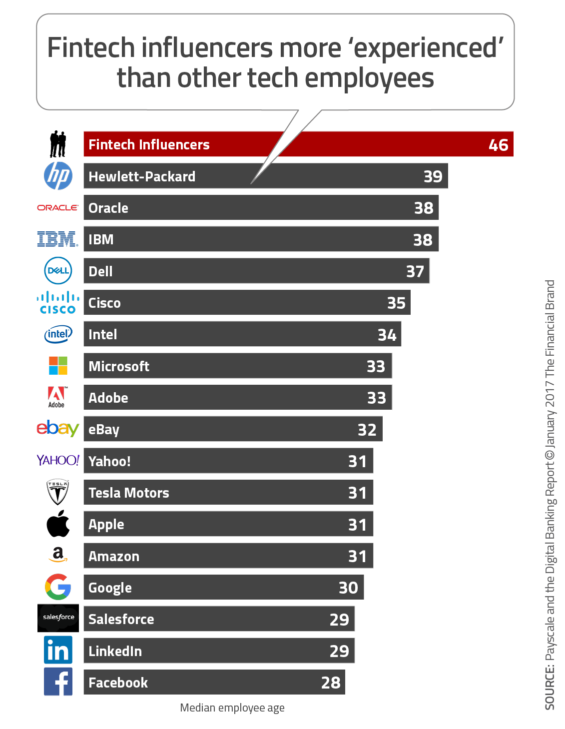There is no denying that high tech is a hot industry. Fintech is also a white hot industry. As a result, to recruit and retain top talent, companies have to pay top dollar and provide work environments that in-demand geeks want.
But, are all tech companies created equal? And, when it comes to fintech, is the profile of a fintech worker the same as one who works for Facebook, Google, Amazon or Apple?
Using an extensive compensation database, PayScale examined the characteristics of some of the largest and best known tech companies. Their interactive database provides insight into salaries at different levels within the companies, the median age of employees, overall experience and tenure as well as the gender composition and job satisfaction.
While there is no such survey for fintech start-ups, we thought it would be interesting to at least compare the ages of some of the recognized leaders in the financial services industry. This effort was first initiated by Radu Topliceanu from Sberbank Europe. The Digital Banking Report asked for his help in compiling demographics for the top 10 fintech influencers compiled by Richtopia, Jay Palter, The Financial Brand and Onalytica.
Young Employees Dominate High Tech Companies
Since some of the large tech companies have a substantial retail presence (e.g., Apple, Microsoft, etc.), the study eliminated retail workers to keep the data focused on corporate employees. PayScale also didn’t limit the survey to just IT workers, but included workers in job types such as marketing, administration, finance, etc.
Workers at the majority of high tech companies are overwhelmingly young and male. Seven of the 18 companies evaluated had a median employee age of 30 or younger, and ten had workforces with less than 30 percent female employees.
Employees at the more established tech companies (IBM, HP, Oracle and Intel) reported longer tenures with their current employers. In fact, these were the only companies where the median employee tenure was five years or more. These firms, along with other tech stalwarts such as Dell, Cisco, Microsoft and Adobe, have employees with median ages that are 5-10 years older than Facebook, LinkedIn, Salesforce and Google.
The questions remain – How young is too young? Does experience matter? Where in the organization do the most tenured employees reside? Does the average age of the employees impact an organization’s culture … or the other way around?

Why Industry Cloud for Banking?
PwC’s Industry Cloud for Banking helps deliver personalized products and services that today’s customers expect.

Navigating Credit Card Issuing in an Uncertain Economic Environment
Build a modern credit card strategy that balances profitability and risk, adopts the latest technology and delivers the customization that cardholders demand.
Read More about Navigating Credit Card Issuing in an Uncertain Economic Environment
Fintech Influencers: Older and Wiser?
To analyze the average age of fintech influencers, Topliceanu used four source lists of influencers and calculated the age for the top 10. While, in some cases, ages were estimated based on graduation years, some were included in the individual’s LinkedIn, Twitter or Facebook profile. In any case, the average age was 46 … 7 years older than the average age at HP and almost 20 years older than the average age at Facebook.
As mentioned by Topliceanu in his initial analysis of fintech influencers, “Fintech influencers do not fit the idyllic image of the young, fresh college graduate (or dropout). People like Brett King, Chris Skinner, Ron Shevlin and Bradley Leimer are more senior (no offense).”
Obviously, part of the age bias is created by the fact that we are using a subset of the entire fintech community. Most influencers have leveraged their tenure to reach ‘influencer’ status. Another component of the equation could be that, like the more established tech firms, fintech by definition, includes a component of legacy financial services. Many of the influencers work in banking today or used to.
We totally understand that we are not comparing apples to apples, but similar questions remain as there were with tech firms – How old is too old? Does experience matter? How do younger, less experienced people make an impact in the fintech community? And, does the average age of the fintech influencer impact an industry’s culture … or the other way around?
Some thoughts from around the globe …
“The average age of a private banker in Switzerland is 62. The average age of a Google employee is 30. Therefore if you merge Fin and Tech, you would expect an average age of 46. It’s good to have some old farts around too.”
– Chris Skinner, Chief Executive Officer at The Finanser Ltd.
“Bank boards are oftenl made up of older, semi-retired bankers. Digital transformation of banking doesn’t only mean technology, but engaging those younger and better equipped for the next age of banking.”
– Brett King, Founder and CEO of Moven
“Relevant outcome! For me it is the mix of attitude and expertise that makes the difference.”
– Ramona Groapa, HR Lead at IBM
“Millennial is a mindset! Well-done!”
– April Rudin, President and CEO of The Rudin Group
“I agree that innovation is a matter of mindset than age. Successful fintech firms need a good combination of industry/process/regulatory/customer expectation knowledge (which comes with experience) on one hand and knowledge of new technologies that can enable the innovative customer experience (from the younger generation) on the other.”
– Kumar Ramachandran, EMEA Managing for Citi
“Very interesting analysis.I would agree that being innovative is not a matter of age but of attitude!”
– Aleksandar Blagojevic, Digital Banking Manager at Societe Generale
Author’s note: The average age of fintech influencers would trend quite a bit younger without the inclusion of an outlier sexagenarian named Jim Marous.








